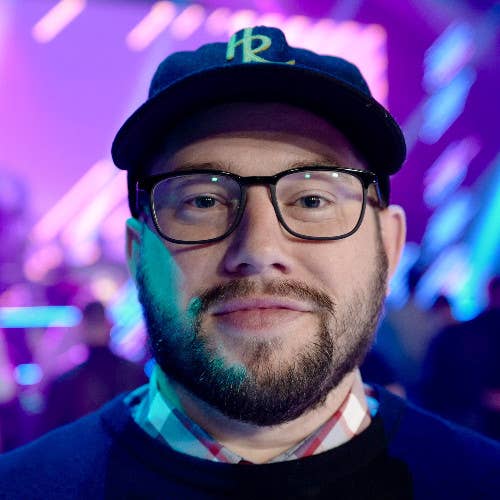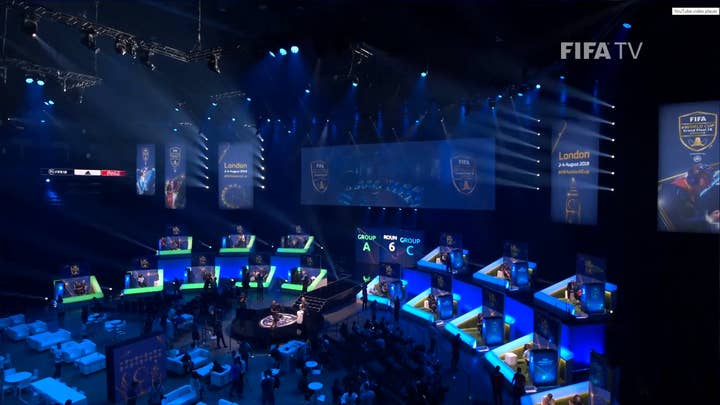EA: Diversity and engagement key to growing FIFA eWorld Cup
FIFA competitive gaming commissioner shares how the game's accessibility will lead to success across a wider swath of media
As traditional sports face concerns of slowly deteriorating viewership, esports is only getting more popular.
FIFA 18, despite having its roots in the old guard of "real" sports, enjoyed an 80 per cent increase in average viewers over the last season.
Now in its second year, the FIFA Global Series programme is the poster child for Electronic Arts' esports aspirations, culminating over the weekend with the first-ever eWorld Cup in the O2 Arena, London.
Ahead of the event, GamesIndustry.biz caught up with FIFA competitive gaming commissioner Brent Koning to discuss the game's rise an esport.

"The interesting thing that we have going for us is it's really a ball, and a net," he says. "The face of our title is quite easy to understand. So whether you're a hardcore gamer, just a football fan, or you have no idea what football is, FIFA is accessible."
While the FIFA Global Series has grown over the last year, it's not been without its setbacks. But, as Koning explains, Electronic Arts has thrown its full support behind the programme, giving it license to fail on its way to success.
"As with every single form of entertainment, every video game, every new initiative, there's always challenges," says Koning. "We're one of the most licensed products in the world, we've got a tremendous amount of exposure, and with that exposure comes a standard level of expectations... You want more people to watch, you want more people to attend, you want your game to be flawless. You want all of your advertising and sponsor partners to be happy.
"What I can say about the challenges is that EA is 100 per cent behind making this a success. And with that comes this really, really cool support that it's okay to fail. You can mess some things up; it's how you rebound from those and learn from those to help make your product better. That is what we're capitalising on... There are always challenges, but how you tackle them is how we define success."
"The interesting thing that we have going for us is it's really a ball, and a net... so whether you're a hardcore gamer, just a football fan, or you have no idea what football is, FIFA is accessible"
With both football and esports being traditionally male-dominated spaces, diversity is another challenge the organisation is facing.
"You see not just video games changing, but the sports landscape is changing as well," says Koning. "The most viewed soccer match of all time in North America was the women's world cup. We have to keep our eye on diversity all the time... that's what's in front of the camera, but most importantly what's not in front of the camera. That's what makes us actually diverse, not the perception of diversity.
"We've had 60 nations participate in our programme this year, so what we're trying to do is we're trying to build a platform that can adapt, but also we're in a spot where we need to do better in certain areas. That is something we're constantly working on. Whether that's ethnic diversity, gender diversity, even age diversity to be honest...
"Do we have work to do? Absolutely. The industry does. Entertainment does. You've seen the headlines. We're all doing better. We're an open tournament and the goal here is to be diverse, not just when the camera is rolling, and truly live that. So we're going to continue to do that."

Key to the growing momentum of the FIFA Global Series thus far is the relationship EA shares with the 20 football clubs, 35 endemic esports organisation, and eight leagues around the world which support its events and teams.
"We've had a tremendous success building our players into superstars," says Koning. "Our goal is to definitely springboard from the eWorld Cup into next year. We had a tremendous football year; champions league was amazing this year, the world cup was one of the best ever, and we can only benefit from that.
"EA is 100 per cent behind making this a success... You can mess some things up; it's how you rebound from those and learn from those to help make your product better"
"The things that we are doing with the game are to help make it more accessible; that's a goal of ours. I want more people to engage with what we're doing as a form of entertainment, and that's really the job of me and my team as we start to look to next year... we're poised to be really successful in the future, and we'll use this weekend as a springboard to do that."
As traditional sports bosses worry about about how millennials are moving away from television toward digital platforms, EA's Competitive Gaming Department understands that the metrics have simply evolved.
"FIFA as a game has changed over the years, but so has entertainment," Koning continues. "Our friends over at Epic, and the guys at Blizzard doing the Overwatch League, those teams are trying to bring content to the masses in numbers that actually are pretty amazing.
"We're along for that ride as well and our numbers are comparable with our peers. TV has always been king, that's always been the metric. Well, if I can get a million people to watch a FIFA match that I can broadcast online, that's typical viewership for some of the football leagues around the world."
Koning argues it's not raw numbers of people tuning in to watch a match that is your metric for success anymore, but the transmedia engagement of fans, fostered by the mutually beneficial relationship of FIFA as an esport and football as cultural pastime.
"We look at how our numbers compare across all of our platforms," says Koning. "We're broadcasting linear numbers and digital numbers, so I want hundreds of thousands people to be watching. That's our goal, that's our expectation.
"People that consume content, they do it so many ways; you have people on mobile, you have people on web, you have people on actual television. You also have people consuming on Twitter, and consuming parts of matches and parts of the tournament. We are in a new age of how we metric our success."








